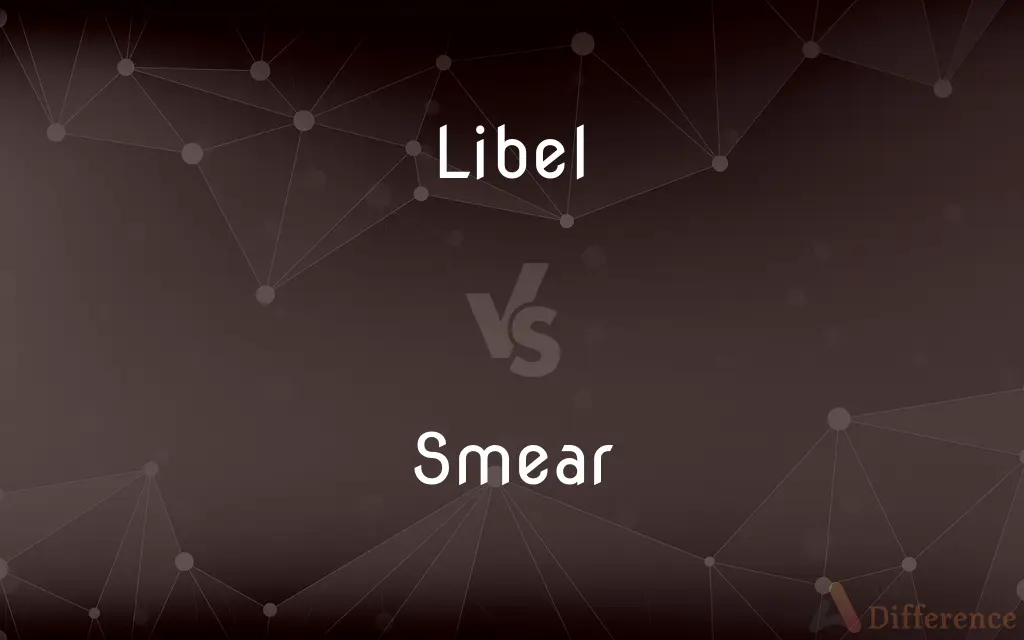Libel vs. Smear — What's the Difference?
Edited by Tayyaba Rehman — By Fiza Rafique — Updated on March 29, 2024
Libel involves publishing false statements damaging to a person's reputation, while smear refers to efforts, often unsubstantiated, aimed at discrediting someone's character or reputation.

Difference Between Libel and Smear
Table of Contents
ADVERTISEMENT
Key Differences
Libel is a legal term that refers to the act of making written defamatory statements or representations that unjustly harm the reputation of an individual or entity. On the other hand, smear campaigns may employ libelous statements but can also include true but damaging information, rumors, or insinuations designed to tarnish someone's reputation without necessarily involving legal repercussions.
The key distinction between libel and smear lies in their medium and intent. Libel specifically involves written or published material that is false and damaging, whereas smear tactics can span verbal slander, written libel, or any other method aimed at discrediting an individual, often for political, personal, or commercial gain.
Libel is actionable in court, meaning individuals or entities can sue for damages if they can prove the published material was false, defamatory, and caused harm to their reputation. Smear efforts, while potentially including libelous actions, may not always lead to legal action, especially if the statements are not defamatory or if actual evidence supports them.
One of the main challenges in libel cases is proving the falsity of the statement and its direct impact on one's reputation, requiring clear evidence and legal arguments. In contrast, the effectiveness of a smear campaign is often measured by its capacity to influence public perception, regardless of the veracity of its claims.
Understanding the nuances between libel and smear is crucial, especially in the digital age where information spreads rapidly. Libel pertains to the realm of legal defamation through written or published falsehoods, while smear encompasses a broader strategy of reputation damage, not confined to the truthfulness or medium of the disparaging information.
ADVERTISEMENT
Comparison Chart
Definition
False, written statements that damage a person's reputation.
Efforts aimed at discrediting someone's character or reputation, often without basis.
Medium
Written or published materials.
Can be verbal, written, or published in various formats.
Legal Standing
Actionable in court; subjects to defamation laws.
May not always be actionable unless it constitutes libel or slander.
Intent
To harm someone's reputation through falsehoods.
To discredit or tarnish someone's reputation, regardless of the truth.
Proof Required
Plaintiffs must prove the statement was false and damaging.
Effectiveness measured by its impact on public perception, not necessarily truthfulness.
Compare with Definitions
Libel
False written statements that harm someone's reputation.
The newspaper was sued for libel for publishing false accusations.
Smear
A campaign aimed at discrediting someone's reputation.
The smear campaign used both truth and lies to tarnish his image.
Libel
Defamatory content in published form.
The article contained libel that damaged the politician's career.
Smear
Efforts to undermine someone's credibility.
The politician faced a smear effort during the election.
Libel
Legal claim against written defamation.
She filed a libel suit against the magazine.
Smear
Using damaging information to discredit.
The smear involved spreading rumors about her past.
Libel
Written defamation subject to lawsuits.
The libelous comments online led to a court case.
Smear
Tactics employed to tarnish a reputation.
Smear tactics were used to influence public opinion against her.
Libel
Publishing untrue statements causing reputational harm.
The blog's post was a clear case of libel against the celebrity.
Smear
Discrediting someone through various means.
The smear against the company involved false allegations.
Libel
A published false statement that is damaging to a person's reputation; a written defamation
He was found guilty of a libel on a Liverpool inspector of taxes
Smear
To spread or daub (a surface, for example) with a sticky, greasy, or dirty substance.
Libel
(in admiralty and ecclesiastical law) a plaintiff's written declaration.
Smear
To apply by spreading or daubing
Smeared suntan lotion on my face and arms.
Libel
Defame (someone) by publishing a libel
The jury found that he was libelled by a newspaper
Smear
To cause to be blurry or spread in unwanted places
The ink on the poster was smeared.
Libel
(in admiralty and ecclesiastical law) bring a suit against
If a ship does you any injury you libel the ship
Smear
To stain or attempt to destroy the reputation of; vilify
Political enemies who smeared his name.
Libel
The legally indefensible publication or broadcast of words or images that are degrading to a person or injurious to that person's reputation.
Smear
(Slang) To defeat utterly.
Libel
An incidence of such publication or broadcast.
Smear
To spread easily in an undesired way
This mascara smears when it gets wet.
Libel
The written claims initiating a suit in an admiralty court.
Smear
A mark made by smearing; a spot or blot.
Libel
To publish or broadcast a libel about (a person).
Smear
A substance to be spread on a surface.
Libel
(countable) A written or pictorial false statement which unjustly seeks to damage someone's reputation.
Smear
(Biology) A sample, as of blood or bacterial cells, spread on a slide for microscopic examination or on the surface of a culture medium.
Libel
(uncountable) The act or tort of displaying such a statement publicly.
Smear
Vilification or slander.
Libel
(countable) Any defamatory writing; a lampoon; a satire.
Smear
A vilifying or slanderous remark.
Libel
A written declaration or statement by the plaintiff of their cause of action, and of the relief they seek.
Smear
(transitive) To spread (a substance, especially one that colours or is dirty) across a surface by rubbing.
The artist smeared paint over the canvas in broad strokes.
Libel
(countable) A brief writing of any kind, especially a declaration, bill, certificate, request, supplication, etc.
Smear
(transitive) To cover (a surface with a layer of some substance) by rubbing.
She smeared her lips with lipstick.
Libel
To defame (someone), especially in a manner that meets the legal definition of libel.
He libelled her when he published that.
Smear
(transitive) To make something dirty.
Libel
To proceed against (goods, a ship, etc.) by filing a libel claim.
Smear
(transitive) of a substance, etc. To make a surface dirty by covering it.
Libel
A brief writing of any kind, esp. a declaration, bill, certificate, request, supplication, etc.
A libel of forsaking [divorcement].
Smear
(transitive) To damage someone's reputation by slandering, misrepresenting, or otherwise making false accusations about them, their statements, or their actions.
The opposition party attempted to smear the candidate by spreading incorrect and unverifiable rumors about their personal behavior.
Libel
Any defamatory writing; a lampoon; a satire.
Smear
(transitive) To cause (something) to be messy or not clear by rubbing and spreading it.
Libel
A malicious publication expressed either in print or in writing, or by pictures, effigies, or other signs, tending to expose another to public hatred, contempt, or ridicule. Such publication is indictable at common law.
Smear
(intransitive) To become messy or not clear by being spread.
The paint is still wet — don't touch it or it will smear.
Libel
The crime of issuing a malicious defamatory publication.
Smear
(transitive) To write or draw (something) by spreading a substance on a surface.
Libel
A written declaration or statement by the plaintiff of his cause of action, and of the relief he seeks.
Smear
(transitive) To cause (something) to be a particular colour by covering with a substance.
Libel
To defame, or expose to public hatred, contempt, or ridicule, by a writing, picture, sign, etc.; to lampoon.
Some wicked wits have libeled all the fair.
Smear
(transitive) To rub (a body part, etc.) across a surface.
Libel
To proceed against by filing a libel, particularly against a ship or goods.
Smear
(transitive) To attempt to remove (a substance) from a surface by rubbing.
Libel
To spread defamation, written or printed; - with against.
What's this but libeling against the senate?
[He] libels now 'gainst each great man.
Smear
(climbing) To climb without using footholds, using the friction from the shoe to stay on the wall.
Libel
A tort consisting of false and malicious publication printed for the purpose of defaming a living person
Smear
A mark made by smearing.
This detergent cleans windows without leaving smears.
Libel
The written statement of a plaintiff explaining the cause of action (the defammation) and any relief he seeks
Smear
A false or unsupported, malicious statement intended to injure a person's reputation.
Libel
Print slanderous statements against;
The newspaper was accused of libeling him
Smear
(biology) A preparation to be examined under a microscope, made by spreading a thin layer of a substance (such as blood, bacterial culture) on a slide.
Smear
(medicine) A Pap smear screening test for cervical cancer.
I'm going to the doctor's this afternoon for a smear.
Smear
Any of various forms of distortion that make a signal harder to see or hear.
Smear
(climbing) A maneuver in which the shoe is placed onto the holdless rock, and the friction from the shoe keeps it in contact
Smear
(music) A rough glissando in jazz music.
Smear
To overspread with anything unctuous, viscous, or adhesive; to daub; as, to smear anything with oil.
Smear
To soil in any way; to contaminate; to pollute; to stain morally; as, to be smeared with infamy.
Smear
To smudge, blur, or render indistinct (writing, pictures, etc.).
Smear
To vilify (a person); to damage (a person's reputation), especially falsely or by unfair innuendo, and with malicious intent.
Smear
A fat, oily substance; oinment.
Smear
Hence, a spot made by, or as by, an unctuous or adhesive substance; a blot or blotch; a daub; a stain.
Slow broke the morn,All damp and rolling vapor, with no sun,But in its place a moving smear of light.
Smear
Slanderous defamation
Smear
A thin tissue or blood sample spread on a glass slide and stained for cytologic examination and diagnosis under a microscope
Smear
A blemish made by dirt;
He had a smudge on his cheek
Smear
An act that brings discredit to the person who does it;
He made a huge blot on his copybook
Smear
Stain by smearing or daubing with a dirty substance
Smear
Make a smudge on; soil by smudging
Smear
Cover (a surface) by smearing (a substance) over it;
Smear the wall with paint
Daub the ceiling with plaster
Smear
Charge falsely or with malicious intent; attack the good name and reputation of someone;
The journalists have defamed me!
The article in the paper sullied my reputation
Common Curiosities
What is required to prove libel in court?
To prove libel, one must demonstrate that the statement was false, published, and caused reputational harm.
Can a truth be considered a smear?
While smears often involve falsehoods, true information can also be used in a smear campaign if it's presented in a misleading or damaging way.
How do smear campaigns affect public figures?
Smear campaigns can significantly damage a public figure’s reputation, affecting their career, public perception, and personal life.
Can opinions be considered libel?
Opinions are not typically subject to libel claims unless they imply untrue defamatory facts as their basis.
How can someone protect themselves against libel?
Protecting against libel involves ensuring one does not publish false and damaging statements and may include taking legal action if defamed.
Is all negative press considered libel?
No, negative press is not automatically libelous; it must be false and damaging to someone's reputation to qualify as libel.
Are social media posts considered libel if they’re false and damaging?
Yes, social media posts can be considered libel if they meet the criteria of being false, published, and damaging to someone’s reputation.
What legal defenses are available for libel accusations?
Common defenses include proving the statement was true, constituted a fair comment, or was made in a privileged context.
Is it easy to win a libel case?
Winning a libel case can be challenging, requiring clear evidence that the statement was false, made with a harmful intent, and caused reputational damage.
Can businesses be victims of libel and smear campaigns?
Yes, businesses can be targets of both libel and smear campaigns, affecting their reputation and financial standing.
What distinguishes slander from libel and smear?
Slander involves spoken defamation, while libel refers to written defamation, and smear can include both but emphasizes the intent to discredit.
What impact does the internet have on libel and smear?
The internet has amplified the reach and speed at which libelous statements and smear campaigns can spread, increasing their potential impact.
How do smear campaigns spread?
Smear campaigns spread through media, word-of-mouth, social media, and other communication channels, often rapidly.
How do public figures combat smear campaigns?
Public figures often combat smear campaigns through public relations efforts, legal action, and engaging directly with their audience to refute false claims.
Can someone be sued for sharing libelous content online?
Yes, sharing or republishing libelous content can make someone liable for defamation, even if they are not the original author.
Share Your Discovery

Previous Comparison
Bliss vs. Euphoric
Next Comparison
Irony vs. ParodyAuthor Spotlight
Written by
Fiza RafiqueFiza Rafique is a skilled content writer at AskDifference.com, where she meticulously refines and enhances written pieces. Drawing from her vast editorial expertise, Fiza ensures clarity, accuracy, and precision in every article. Passionate about language, she continually seeks to elevate the quality of content for readers worldwide.
Edited by
Tayyaba RehmanTayyaba Rehman is a distinguished writer, currently serving as a primary contributor to askdifference.com. As a researcher in semantics and etymology, Tayyaba's passion for the complexity of languages and their distinctions has found a perfect home on the platform. Tayyaba delves into the intricacies of language, distinguishing between commonly confused words and phrases, thereby providing clarity for readers worldwide.














































